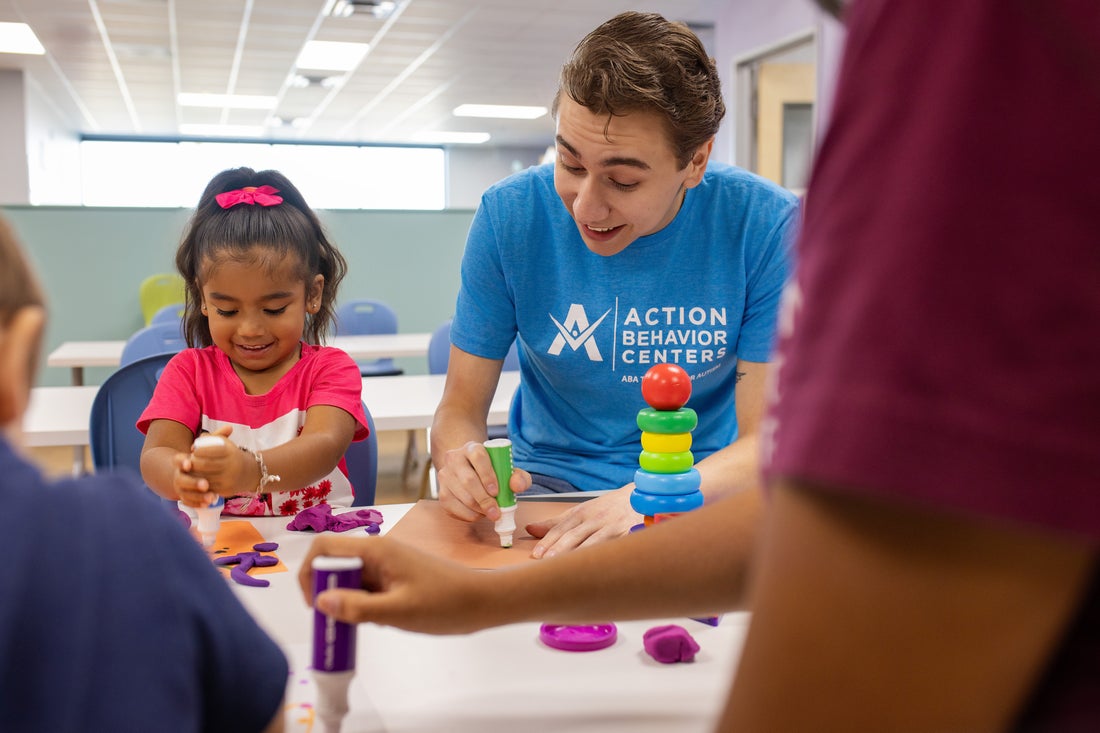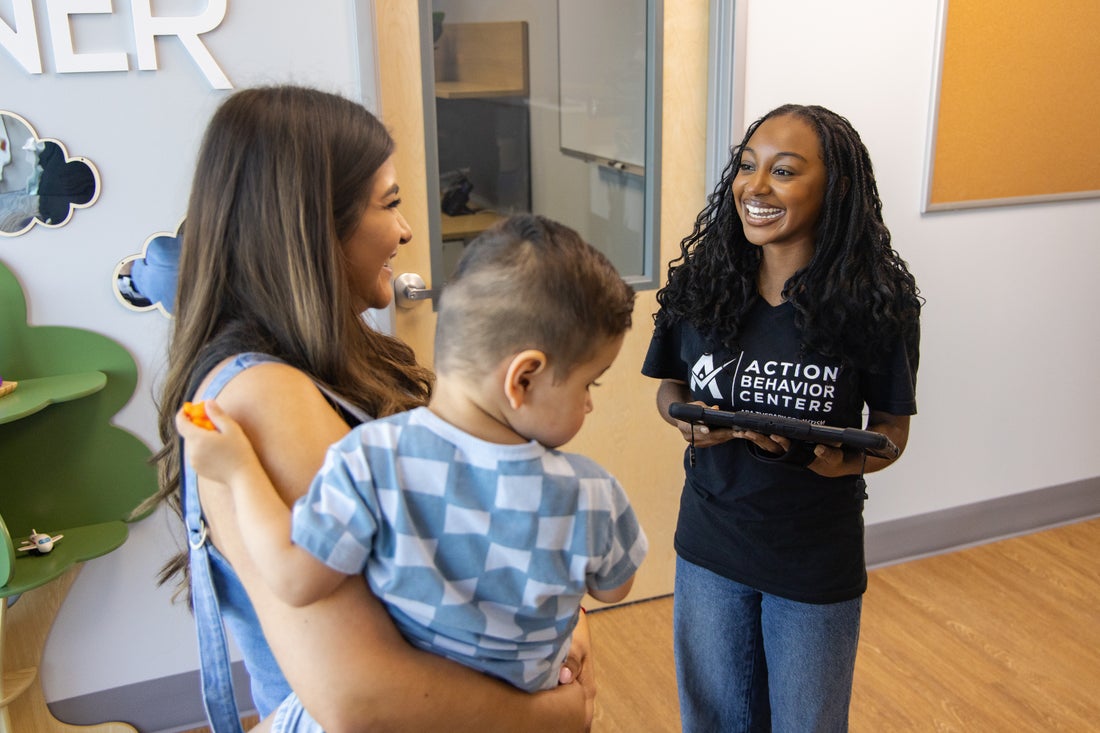What to Expect from a Pediatric ABA Therapy Program: A Parent's Guide

When your child is first diagnosed with autism spectrum disorder (ASD), one of the first treatment recommendations you may hear about is applied behavior analysis (ABA) therapy. ABA is an evidence-based, highly personalized treatment that helps children build communication and social skills while reducing behaviors that can make learning harder.
This parent-friendly guide walks you through what a typical day looks like in center-based ABA therapy at Action Behavior Centers, , so you know what to expect and how your child is supported throughout the day.
What is ABA therapy?
Applied behavior analysis is a research-backed approach that uses positive reinforcement and individualized teaching to help autistic children learn meaningful skills for everyday life. Skills are broken down into manageable steps and taught through hands-on practice, play, and repetition.
ABA therapy commonly focuses on helping children build skills in areas such as:
- Communication, including expressive and receptive language
- Social interaction and play skills
- Daily living skills, like dressing and mealtime routines
- Executive functioning, such as attention, transitions, and following routines
At Action Behavior Centers, every ABA program is individualized, data-driven, and built around your child’s strengths and your family’s goals.
The first days of ABA: building trust through pairing
Before any teaching begins, ABA therapy starts with a foundational step called pairing. Pairing helps children feel comfortable, saf, which is a foundational step that helps children feel comfortable, safe, and excited to learn by building a positive relationship with their therapy team.
During early ABA therapy sessions, therapists focus on:
- Following your child’s interests
- Engaging with favorite toys or activities
- Sharing positive interactions and fun moments
- Learning what motivates your child
- Creating an environment where your child feels secure
Pairing typically lasts a few days to about a week, depending on your child’s comfort level. This step is especially important for children diagnosed with autism because it helps them learn while maintaining a sense of connection. When trust is established first, learning feels more enjoyable and less overwhelming.
Learn more: What Is Pairing in ABA Therapy?

What happens after pairing? Understanding two ABA teaching methods
A full day of aba therapy includes a thoughtful balance of Discrete Trial Teaching (DTT) and Natural Environment Teaching (NET). Both approaches support skill development, but in different ways.
Discrete Trial Teaching (DTT)
DTT breaks new skills into small, achievable steps. Each trial includes a clear instruction, the child’s response, and positive reinforcement. Skills are practiced repeatedly until they are learned and retained.
DTT is structured and highly individualized, similar to a personalized classroom experience. Your child may work at a table, on the floor, or wherever they learn best. Activities may include:
- Matching pictures or objects
- Following one-step directions
- Practicing sounds, words, or gestures
- Imitating actions
- Building early school readiness skills
- Developing eye gaze, joint attention, or turn-taking
Therapists provide immediate feedback and collect data throughout the session. This helps your child build strong foundational skills in a clear, supportive way.
Natural Environment Teaching (NET)
NET focuses on teaching skills within everyday activities and familiar environments. While your child engages in preferred activities, therapists create learning opportunities tied to preselected goals.
During NET, therapists help children build skills such as:
- Requesting items or help
- Sharing and turn-taking
- Name recognition
- Motor and coordination skills
- Functional communication
Examples of NET may include:
- Learning colors while building with blocks
- Practicing communication while requesting a favorite item
- Working on peer interaction during shared activities
- Using functional language during pretend play
Skills introduced during DTT are often reinforced during NET to support generalization, or the ability to use skills across different people, places, and situations.

What does a day in pediatric ABA therapy look like?
Center-based ABA therapy at ABC is personalized, predictable, and designed to keep children engaged throughout the day. While schedules vary based on individual needs, a typical day may look like this:
Step 1: Arrival and warm-up
Your child begins the day with a calm transition into therapy. This time helps them settle in, reconnect with familiar therapists, and prepare for the day ahead.
Step 2: Therapy blocks
Your child rotates through several therapy blocks, each lasting about 45 minutes to an hour. These sessions focus on communication, social interaction, and behavior support.
During therapy blocks:
- Children follow an individualized rotation schedule
- Using structured teaching and play-based interventions, therapists help children reach specific goals following a treatment plan created by a Board Certified Behavior Analyst® (BCBA®)
- Breaks are built in to help your child maintain focus and avoid feeling overwhelmed
Step 3: Mid-morning break
After several therapy blocks, your child takes a break to recharge. This may include a snack, movement, or quiet time.
Step 4: Therapy blocks continue
Therapy resumes with continued skill-building across different settings to help your child apply what they’re learning in new ways.
Step 5: Lunch and relaxation
Lunch and downtime allow your child to relax and prepare for the afternoon.
Step 6: Afternoon focus
Later sessions often emphasize daily living skills and generalization, such as:
- Peer interaction
- Hygiene routines
- Mealtime skills
- Dressing and independence
Step 7: Wrap-up and parent feedback
At the end of the day, therapists review progress and share updates with you about what your child worked on and how they did.
→ Learn more:: How Long Does ABA Therapy Last?

How long does ABA take to show results?
Every child’s experience with aba therapy is unique. Families often notice meaningful changes that show therapy is supporting their child’s development in helpful, practical ways.
Parents may observe changes such as:
- Clearer communication or more attempts to express wants and needs
- Fewer unsafe or disruptive behaviors and reduced frustration
- Increased participation in play or social activities
- Greater independence with daily routines like dressing, brushing teeth, or eating
- Improved flexibility during transitions or changes in routine
- Better attention, engagement, and willingness to participate
- Growing confidence when trying new skills
These changes often build over time as skills are practiced and reinforced. Your child’s BCBA regularly reviews data to understand how skills are developing and adjusts goals as needed. Progress is tracked using graphs and individualized reports to ensure therapy remains personalized.
- Learn more: Benefits of Center-Based ABA Therapy.
How are therapy goals set in ABA programs?
ABA therapy goals are created through a collaborative process that starts with a comprehensive autism assessment of your child’s strengths and needs. Goals are SMART (specific, measurable, achievable, relevant, and time-bound) and are reviewed regularly as your child grows.
Examples of measurable goals may include:
- Increasing spoken requests from five to ten times per day
- Initiating play with peers at least three times daily
- Following steps in a handwashing routine four out of five times
- Identifying ten common household objects by name
How do you measure ABA results?
At ABC, progress is tracked in an online software program called CentralReach. Parents and physicians can stay updated with graphs and progress reports that outline daily success rates with therapy goals. Once a skill is mastered, new goals are introduced to keep learning moving forward.
Explore our pediatric ABA therapy programs today!
A day in aba therapy includes learning, structure, encouragement, and growth. With the right support, children diagnosed with autism can build skills that support independence, communication, and confidence.
If you’re ready to learn how ABA therapy can support your child, we’re here to help.
Schedule a no-cost autism assessment today or visit one of our ABA therapy centers near you to start reaching milestone moments.
At Action Behavior Centers (ABC), we help children diagnosed with autism spectrum disorder (ASD) reach milestone moments. Compassionate care is at the heart of everything we do, and our highly trained clinicians deliver evidence-based applied behavior analysis (ABA) therapy tailored to each child’s unique needs.
Our autism services include diagnostic support, 1:1 individualized care, parent training, school readiness programs, and Early Intensive Behavioral Intervention (EIBI) across hundreds of centers in Arizona, Colorado, Illinois, Minnesota, North Carolina, and Texas. Because no family should have to wait for help, ABC offers immediate access to care. Contact us today to get started.
More posts on:
.jpg)
BCBA Careers: Behavior Analyst Salary Guide
If you’re exploring a career in applied behavior analysis (ABA), or considering your next step as a Board Certified Behavior Analyst® (BCBA®), compensation is an important question to ask. This guide provides a realistic overview of BCBA salary ranges, explains why pay varies, and helps you understand how compensation connects to experience and location.

How Long Does ABA Therapy Last?
At ABC, we provide evidence-based ABA therapy in-center for children ages 18 months to 8 years old, and our ABC Academy program serves school-age children ages 5 to 12. One of the most common questions parents ask is: Once my child begins, how long does ABA therapy last? The answer depends on your child’s unique needs and goals.

What Is Pairing in ABA Therapy?
One of the first and most important steps in applied behavior analysis (ABA) therapy is helping your child build a positive connection with their therapist. This is called pairing. Before any new skills are taught, the therapist focuses on earning your child’s trust and showing them that therapy can be fun and rewarding. Pairing sets the stage for learning by turning the therapist, therapy setting, and even tasks into things your child enjoys.


